Food in Western Europe
It is deeply disturbing to the people of this country to know that Paris, Brussels and other towns throughout France and Belgium have actually suffered more from shortage of food and other essential supplies since the liberation than before, and that the position is not much better now than it was last autumn. Something of this widespread feeling was reflected in speeches in the House of Commons on Tuesday. Undoubtedly public opinion here strongly supports such action as the Government has been able to take in
making some part of our comPiatively-slender reserves of food available for France and in sending lorries foi transport. What is specially needed in France is more lorries and railway rolling-stock, and a far greater effort will have to be made before life will become tolerable in liberated territory. The Anglo-French financial agree- ment signed by Sir John Anderson on Monday provides for the delivery by Great Britain of arms, industrial equipment and raw materials. A high priority ought to be given for the shipment of these goods. Meantime correspondents at the front have been com- menting on the fact that in many conquered German towns the civilians appear to have stocks of food which relieve them of immediate anxiety, and some indignation has been expressed at the use of American transport for carrying food to the Germans when no transport is available for the liberated people of France and Belgium. We are reminded that Germany is living on looted food, some of it brought frcm France. Though it is no part of Allied policy to starve the Germans, unquestionably it is the duty of the Allies to satisfy the needs of the liberated peoples first. The task of organisation in Europe is becoming more complicated every day, but there is no doubt that in claims upon us Germans are at the bottom of the list.






















